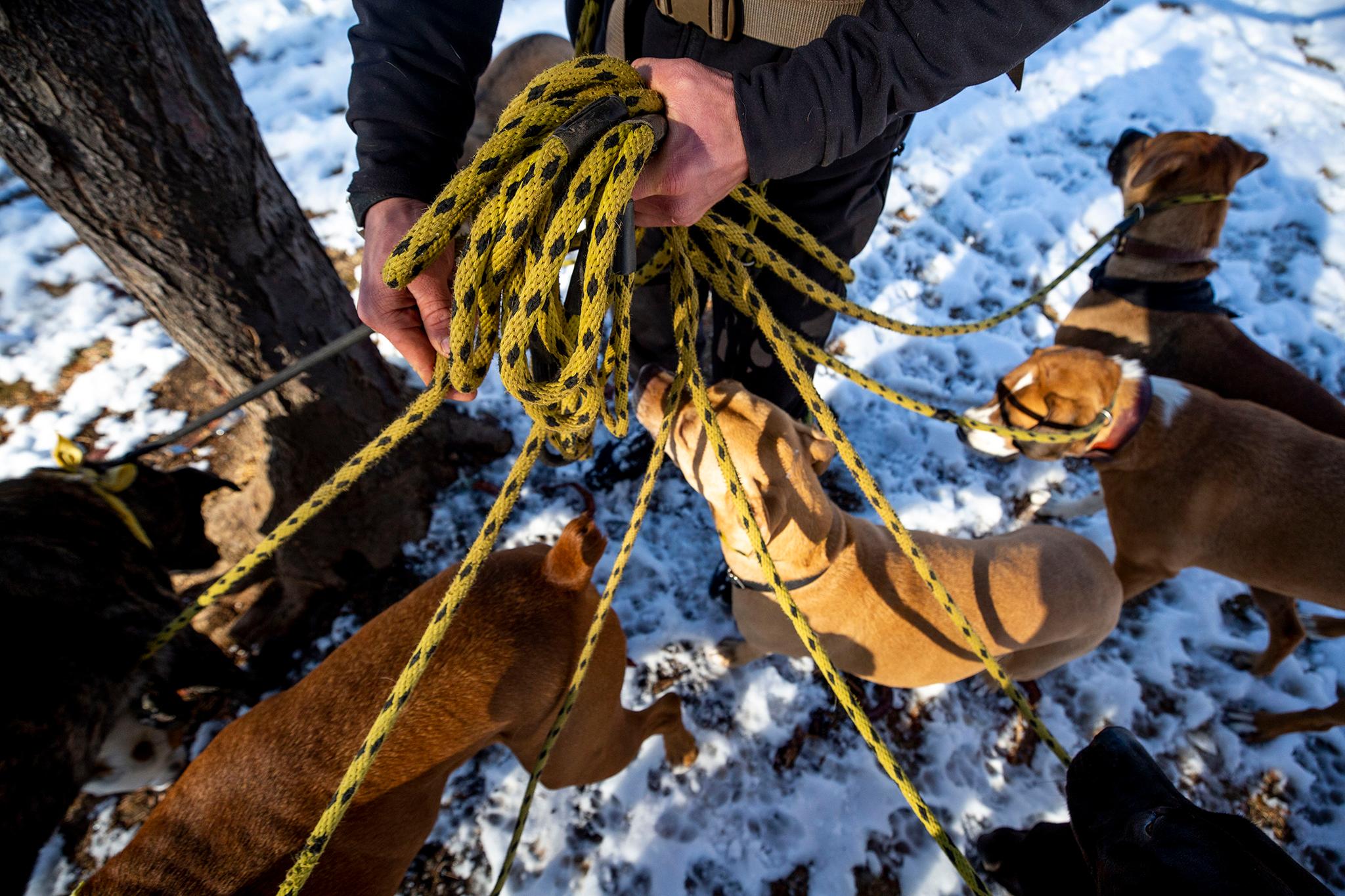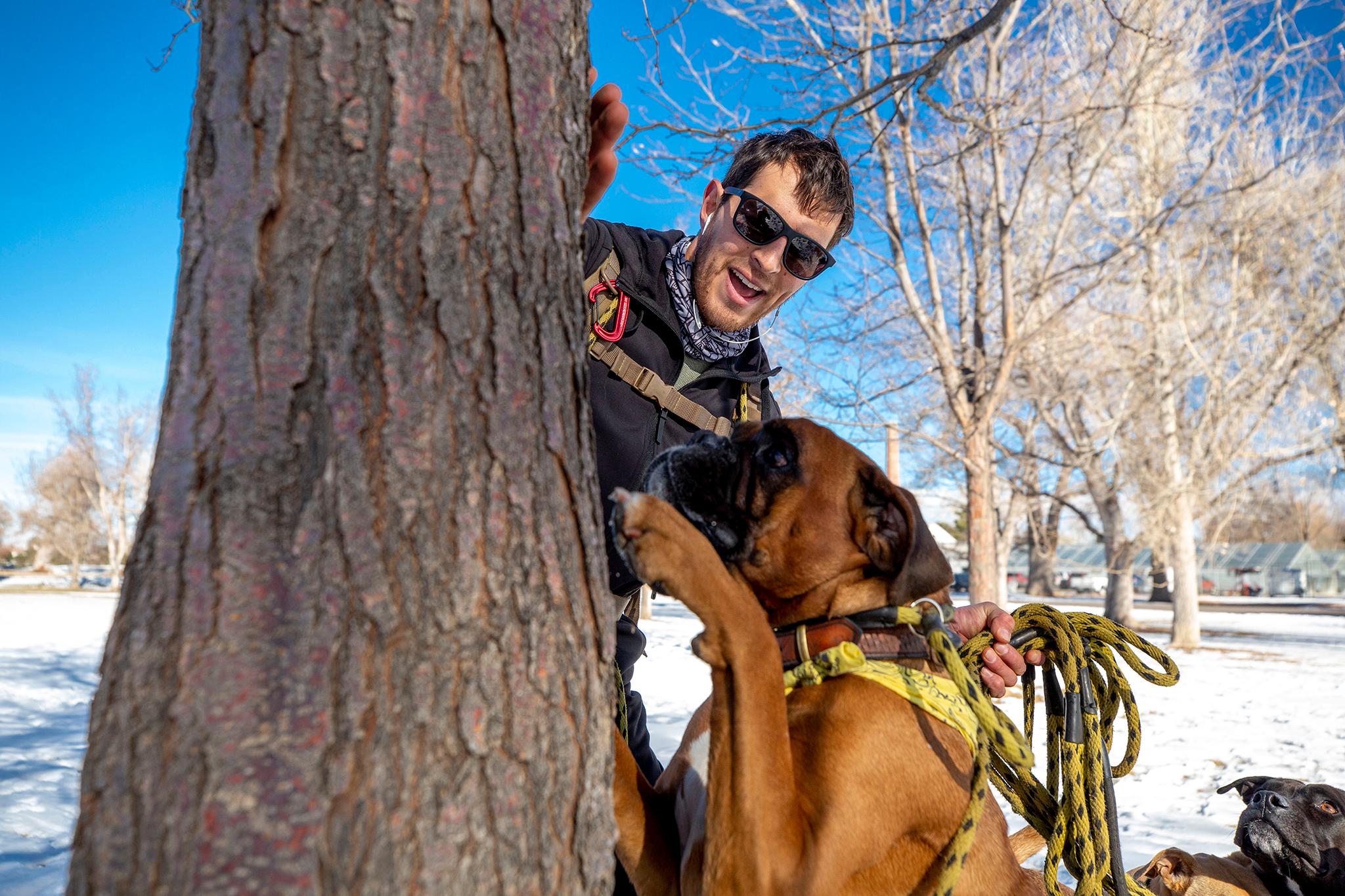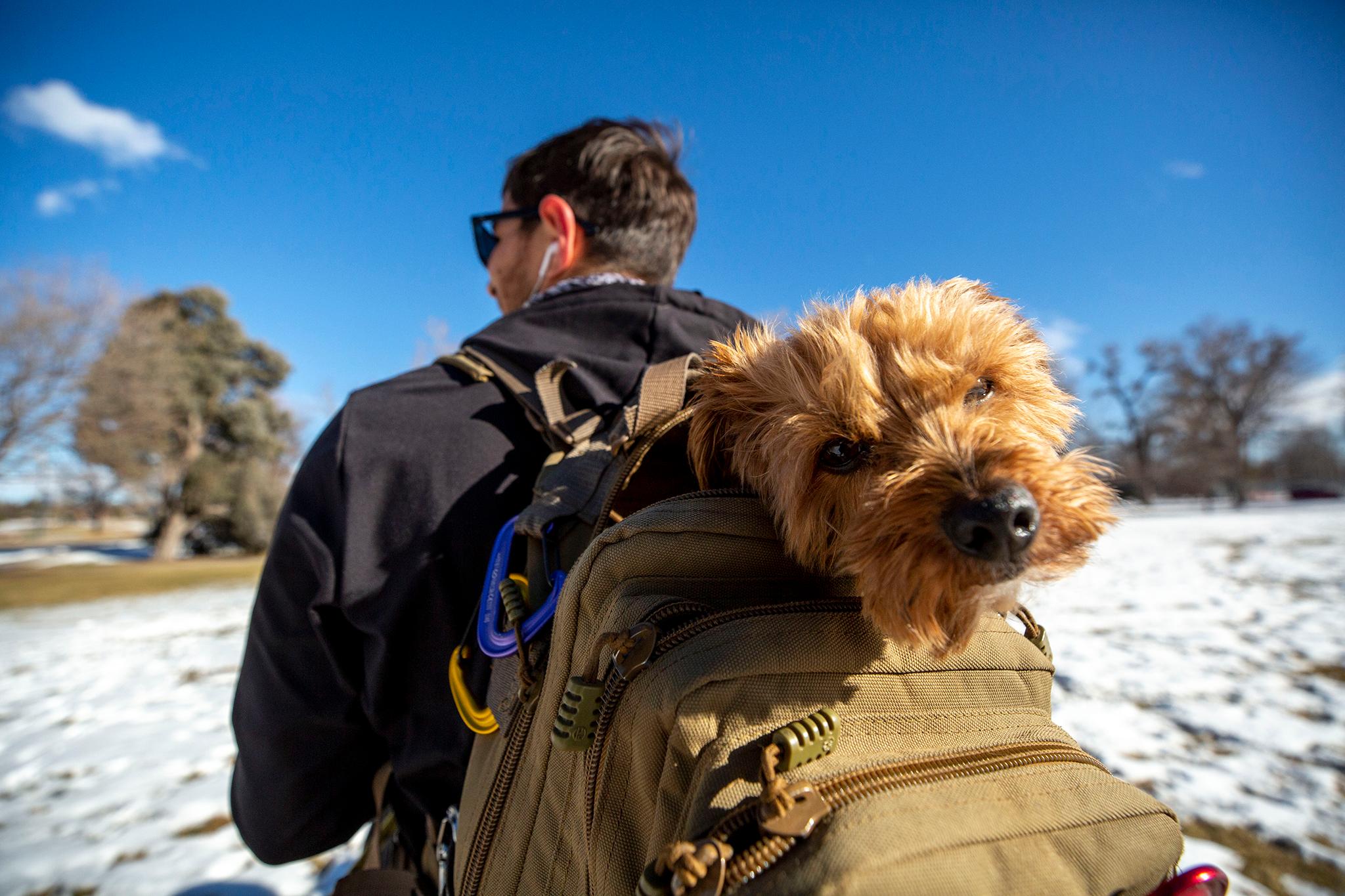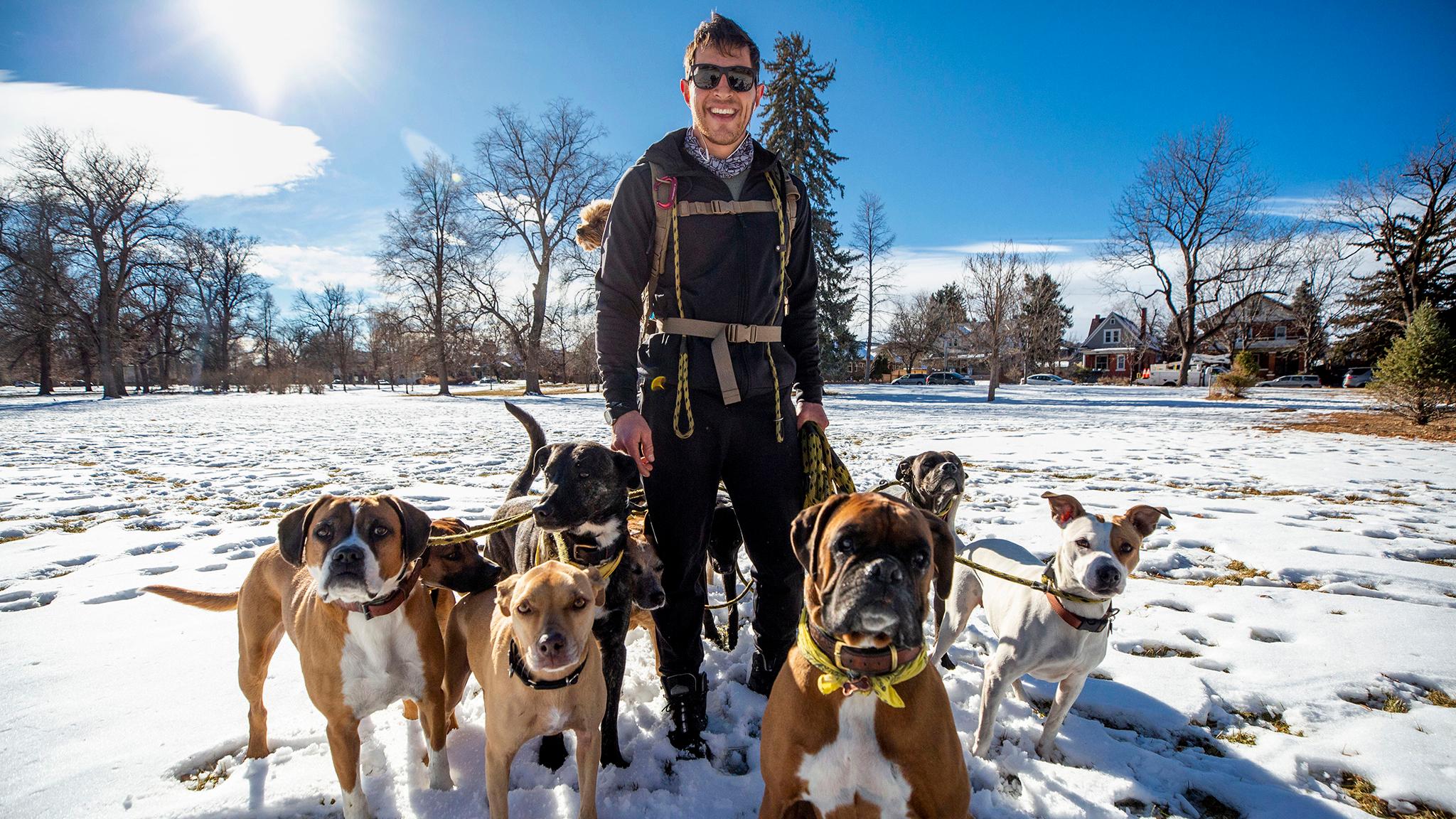When the man with a pack of more than ten well-behaved but ferocious-looking dogs wanders the streets of Denver, traffic comes to a standstill. Drivers hit the breaks. People rubberneck and reach for their cameras to snap photos.
Some of those photos have spread on social media, and have people asking who this guy is and how he keeps all those pups in line.
We did some digging and found him. His name's Felix Merino, a 29-year-old dog walker and trainer who grew up on a Wyoming ranch. He has become a must-see urban spectacle of the past couple years, a roving legend, mostly frequenting Central Park and City Park. But really, all of Denver is Merino's territory.
How does he keep dogs in line?
"With a dog, you have two things. You have trust and respect," he told Denverite. "That's the basis of your relationship. And that's really any relationship, right? To have that trust and respect, the dog has to know that you understand what it's saying. And vice versa. You have to let the dog know in a way that it understands what you need. So it's truly a relationship. And I form that relationship with every dog. And that allows me to walk them."
Outside of his care, these dogs can be biters, lungers and barkers. Some are even feared by their owners, who send them to Merino to be schooled.
Yet even the scariest dogs, when listened to and led with calm assertiveness, can become good companions, Merino insisted. And he's on a mission to teach people how to better relate to their dogs through walking -- one step at a time.
"Denver and humans as a whole can do so much better with our dogs," he said.

Growing up on a ranch south of Jackson Hole until he was 13, Merino saw how dogs that attacked humans were dealt with in Wyoming: a bullet.
"If a dog was human aggressive, at least back in the day, it would get shot before people would waste money on it," he said.
The animals that survived were the ones that complied with humans.
"I grew up around animals and having a connection but not understanding how beautiful they really are," he said.
When he was 13, his parents divorced, and he left the ranch and the 15 horses and 50 cattle that were raised there. But he kept the ranch mentality. He had grown up a John Wayne devotee, raised in a culture that ridiculed fear, and when he faced hard emotions, his default was rage.
"To me, being scared wasn't an option," he said. "And so I covered up being scared with anger. And I learned that got me a response."
Shortly after his parents divorced, his mother was asking him to do chores. He refused. She pushed back, and he exploded, screaming and punching the wall.
"As soon as I punched the wall and started screaming, she was like, 'OK...alright. That's fine. Alright, do what you want to do,'" he said.
The lesson he took away: Getting angry got him what he wanted. He didn't consider how his temper could cause himself and others problems down the line -- especially when he started working with dogs, which can sniff out emotional instability.
Despite his issues with rage, Merino was a good student, on track to win a full-ride scholarship to college. His older brother was the first in the family to receive a college degree, and Merino planned to follow in his footsteps.
One day, after a state wrestling match, he agreed to prank the school with two friends. He and some friends took nearly 300 tires that were destined for the landfill from a local tire shop and used them to barricade the front entrance of their high school. When Merino's involvement surfaced after his wrestling coach recognized his friend's truck, he was suspended from school, his eligibility for the scholarship revoked.
Instead of pursuing college, he joined the Air Force, trying to find a direction in life. One day, as he watched his sergeant's dog, Merino was fascinated by the animal's behavior. The two formed a bond, and Merino started looking for a dog of his own. When the sergeant came on base and said his wife was furious at how their animal had been tearing up the furniture, Merino volunteered to take the dog.
"As soon as I picked him up, I noticed just how lost he was," Merino said. "He's this dog with a lot of energy and, you know, he doesn't really quite know what to do with it."

So Merino started taking the dog, whom he named Django, on long walks and out to the woods, playing fetch with him. Soon his behavior improved. Friends would look at them and ask, "How did you train that dog?" and Merino began assuming the identity of a dog trainer -- even though he had only trained one dog and had no formal education in how to do so effectively.
When he left the Air Force, he moved back to Wyoming to work as a leather craftsman with his dad. Eventually, he moved to Denver, where he would take out his Harley Davidson from time to time. Django would run beside him, unleashed. People would stare with a mix of awe and horror. At the dog park, they would ask him how he trained the dog to be so obedient when they couldn't even keep their animals on leash. He offered to show them how.
His interest in dogs continued to grow, and he took a job at a vet clinic.
"I started to see how people tend to baby their dogs," he said. "Whenever I talked to Django, I talked to him like he was a dog, like: "Hey, come, sit, stay.' And when I was working at the clinic, I saw people going, 'Hi, sweetheart, come here. Oh, you're so cute.' ... And I would analyze this behavior, and I'd see how it made the dog really anxious."
He observed similar patterns at the dog park, and offered his advice to people with unruly pets. He found his methods were working, and he began training dogs on the side.

With $200 in the bank, he decided to start his own dog training company.
He recruited his first clients for his business, Merino K9 Consulting, by going to the dog park or heading out on walks and offering to help people with their aggressive dogs. Oftentimes, seeing how well behaved Django was, they took him up on the offer.
"My whole method was just take the dog and walk them. Just walk them and not let them get away with the nonsense that they would get away with. But keep in mind, I don't know dog behavior up to this point as well as I know now. It was more so not putting up with nonsense, just giving the leash a nice jerk and say 'stop.'"
He started by walking two dogs at a time, then three and four, learning how to build relationships with dogs on the job. He learned about more effective ways of treating dogs and went through therapy to manage his anger so he could bring emotional balance to his work. By that point, people started noticing him as he walked around town, and his walks doubled as advertisements for his dog walking and training company.
One day, he was training a Doberman pinscher using a pronged collar, a controversial tool that gives the dog a biting-like sensation when it pulls on the leash. He had not developed sufficient trust with the animal. When Merino used it to "bite" the dog, he said, the dog bit back, slicing through the vein in his hand. He bandaged himself up, used the injury as a learning opportunity and started researching dog training.
People had been comparing him to Cesar Millan. Merino had no clue who that was but picked up his book and started studying Millan's dog-training strategies. The two trainers have much in common, including an aversion to babying dogs.
"The biggest thing is that whenever people meet dogs, the first thing they do is bend down and coo at it and want to touch it," Merino said. "You know, I always tell people that's like me trying to come up and give you a kiss on the cheek without knowing you or having any association to you. In the least, most people would punch me in the face, right?"

Over the past year, Merino has expanded from dog walking to opening a dog day care where he can work with animals one on one. He also goes to clients' homes to train dogs in their own environments.
Along the way, he's become the envy of dog lovers citywide.
"I get a lot of people that say, like, 'Oh, my God, you have my dream job," Merino said. "And I look at them, and I say, 'Well, f****** do it, then. Then what are you waiting around for?'"
As he tells it, too many people are scared to take risks and do what they want to do.
"I wish more people were more in tune with themselves to realize, like, if you really hate your job that much or you're unhappy where you are or whatever, take the steps to fix it," he said. "That starts first and foremost with knowing yourself."










